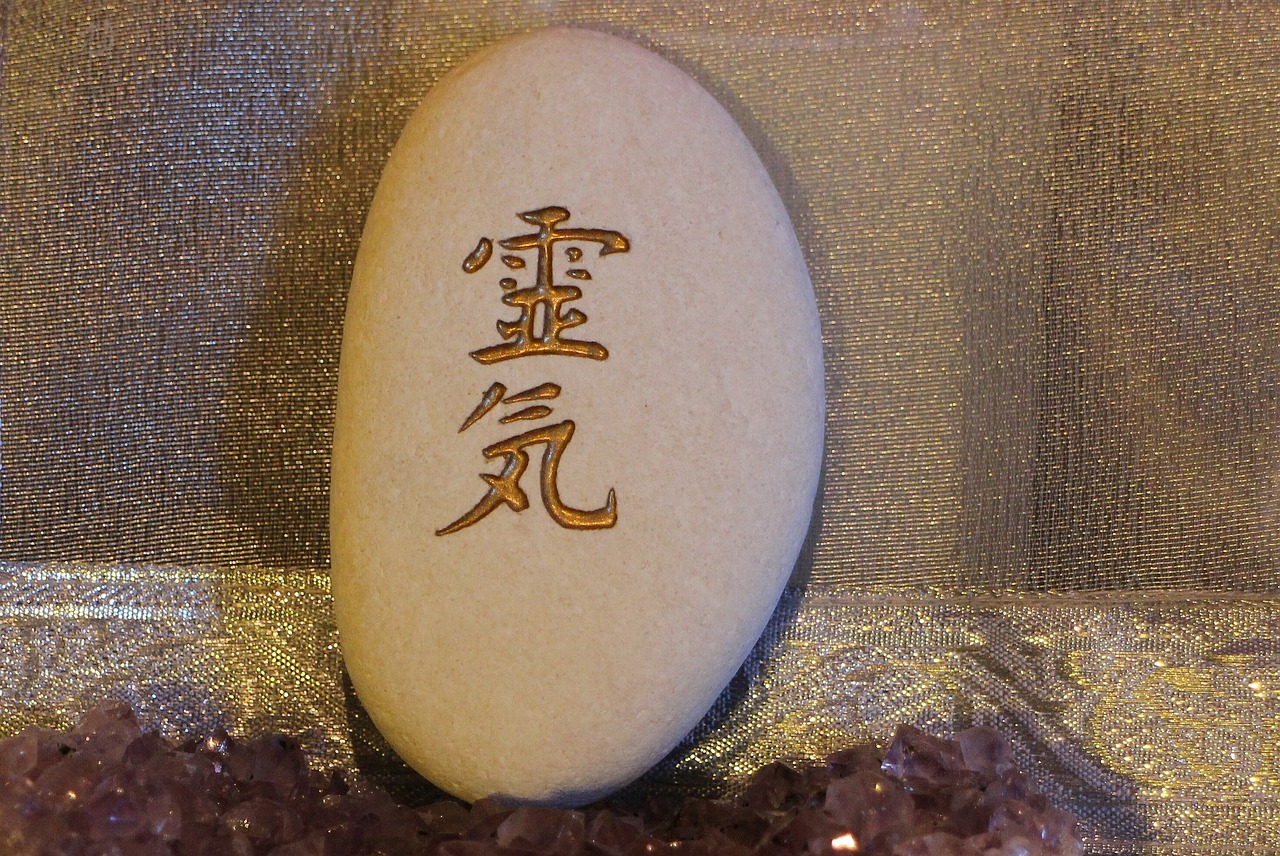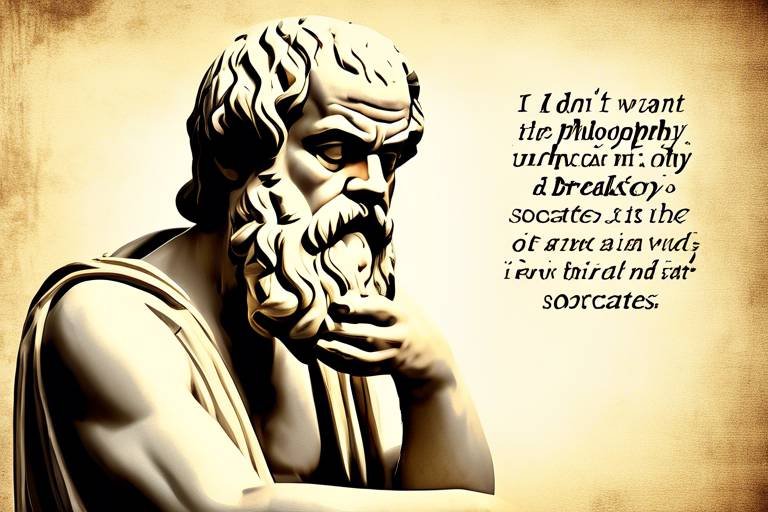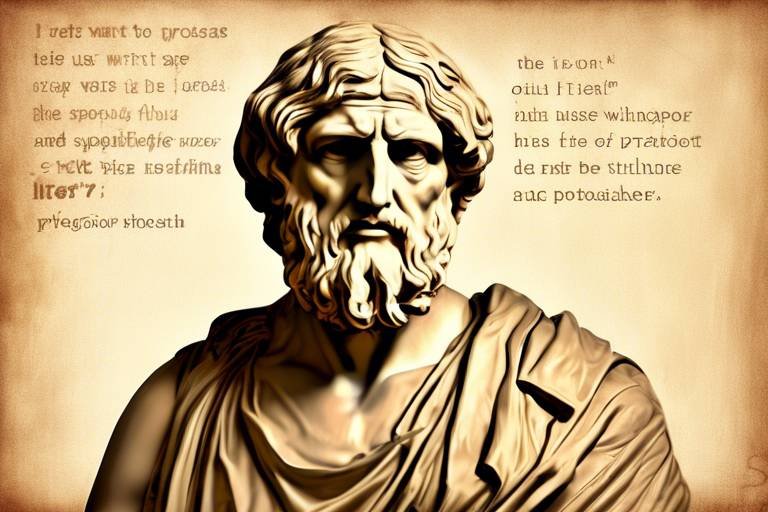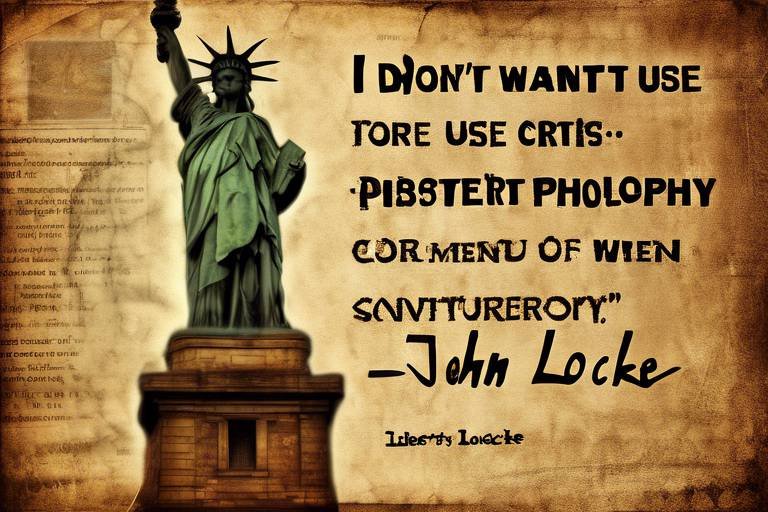Breaking Down the Philosophy of Socrates
Socrates, often hailed as one of the greatest philosophers in history, has left an indelible mark on Western thought. His unique approach to philosophy, characterized by a relentless pursuit of truth and an unwavering commitment to ethics, continues to resonate with us today. But what exactly makes Socratic philosophy so compelling? In this article, we will explore the key elements of his teachings, from the renowned Socratic Method to his profound insights on ethics and virtue. Get ready to dive deep into the mind of a man who challenged the very foundations of knowledge and morality!
The Socratic Method is a fascinating form of dialogue that encourages participants to engage in cooperative argumentative discussions. Rather than simply delivering information, Socrates would ask probing questions, guiding his interlocutors to examine their beliefs critically. This method is not just about finding the right answers; it's about fostering a culture of critical thinking and self-examination. Imagine sitting in a cozy café, sipping coffee, and debating life's big questions with friends. That’s the essence of the Socratic Method – a vibrant exchange of ideas that leads to deeper understanding.
At the heart of Socratic philosophy lies a profound emphasis on ethics and morality. Socrates believed that understanding what is good is essential for leading a virtuous life. He often posed questions like, "What is justice?" and "What does it mean to live a good life?" to challenge his followers to think deeply about their values. Socrates argued that virtue is knowledge, suggesting that if one truly understands what is good, they will naturally act in accordance with that knowledge. This perspective not only shapes individual behavior but also has broader implications for society as a whole.
Socrates famously asserted that "the only true wisdom is in knowing you know nothing." This statement encapsulates his view on knowledge and ignorance. He believed that recognizing our own limitations is the first step toward enlightenment. By admitting our ignorance, we open ourselves up to learning and growth. Imagine walking through a dense fog; the moment you acknowledge that you can't see clearly is the moment you can start navigating your way to clarity. Socrates encouraged individuals to embrace this journey of self-discovery, leading to a more profound understanding of themselves and the world around them.
Self-examination is a cornerstone of Socratic philosophy. Socrates famously stated, "The unexamined life is not worth living." This powerful assertion invites us to reflect on our beliefs, values, and actions. By taking the time to question our motivations and decisions, we can foster personal growth and cultivate a deeper understanding of our own identity. Think of self-examination as a mirror; it reflects not just our outward appearance but also the inner workings of our mind and soul. Through this process, we can align our actions with our true values and live more authentically.
Socrates was a master at questioning assumptions. He believed that many societal norms and beliefs were accepted without critical examination. By challenging these widely held views, he encouraged others to think more deeply and arrive at their own conclusions. It's like peeling an onion – every layer you remove reveals more complexity underneath. This approach not only fosters a deeper understanding of complex issues but also encourages societal progress. When we question our assumptions, we pave the way for new ideas and innovations.
For Socrates, the connection between virtue and knowledge was crucial. He posited that if individuals truly understood what is good, they would naturally act in virtuous ways. This idea suggests that moral behavior is not merely a matter of following rules but rather an outcome of genuine understanding. Imagine a gardener tending to their plants; with the right knowledge and care, the garden flourishes. Similarly, when we cultivate knowledge of virtue, our lives can blossom into something beautiful and meaningful.
The influence of Socratic philosophy extends far beyond his lifetime. His ideas have shaped the course of Western thought and continue to inspire discussions on ethics, reason, and human behavior. Socrates laid the groundwork for future philosophers, encouraging them to explore the depths of human understanding and morality. His legacy is not just a relic of the past; it is a living, breathing force that challenges us to think critically and live ethically.
Socrates' teachings profoundly impacted his students, particularly Plato and Aristotle. Plato, in his dialogues, often depicted Socrates as a central character, using his mentor's methods to explore philosophical concepts. Aristotle, too, was influenced by Socratic thought, building upon it to develop his own theories. This lineage of philosophical thought illustrates how Socrates' ideas have been woven into the fabric of Western philosophy, shaping the way we think about ethics, knowledge, and the human experience.
Even today, Socratic philosophy remains relevant. Its principles can be seen in contemporary education, debate, and personal development. Many educators utilize the Socratic Method to foster critical thinking skills in students, encouraging them to engage in meaningful discussions. In personal development, the practice of self-examination continues to be a valuable tool for growth. Socratic thought invites us to question our beliefs, challenge assumptions, and strive for a deeper understanding of ourselves and the world around us.
- What is the Socratic Method? - A form of dialogue that encourages critical thinking through questioning.
- Why is ethics important in Socratic philosophy? - Socrates believed that understanding virtue is essential for living a good life.
- How did Socrates influence later philosophers? - His teachings shaped the thoughts of Plato and Aristotle, among others.
- Is Socratic philosophy relevant today? - Yes, it remains applicable in education, personal growth, and ethical discussions.

The Socratic Method
The Socratic Method is more than just a technique; it's a way of engaging in dialogue that encourages deep thinking and self-reflection. Imagine sitting down for a cup of coffee with a friend who keeps asking you questions, challenging your assumptions, and pushing you to think critically about your beliefs. That's the essence of the Socratic Method! It’s a form of cooperative argumentative dialogue that Socrates famously used to stimulate critical thinking and illuminate ideas.
At its core, the Socratic Method is about asking questions to draw out ideas and underlying presumptions. Rather than providing answers, Socrates would ask probing questions that forced his interlocutors to examine their own beliefs and the validity of those beliefs. This method encourages individuals to think for themselves rather than simply accepting information at face value. It’s like peeling an onion; each question removes a layer, revealing deeper truths and insights.
One of the most significant aspects of the Socratic Method is its emphasis on self-examination. Socrates believed that an unexamined life is not worth living. This means that we should constantly question our own thoughts and actions. By doing so, we can achieve a greater understanding of ourselves and the world around us. This process of self-examination is not always comfortable; it can lead to moments of discomfort as we confront our own ignorance or flawed beliefs. However, it is through this discomfort that we can grow and evolve.
Moreover, the Socratic Method is not just about individual enlightenment; it also has broader implications for society. By questioning widely held beliefs and assumptions, Socrates challenged the status quo, paving the way for progress and change. When people engage in this method, they can foster a culture of open dialogue and critical thinking, which is essential for any thriving community. It’s like planting seeds of thought that can grow into a forest of ideas!
In practical terms, the Socratic Method can be applied in various settings, including education and personal development. For example, educators can use this method to encourage students to engage with the material on a deeper level, rather than just memorizing facts. By asking open-ended questions, teachers can stimulate discussions that lead to greater understanding and retention of information. In personal development, individuals can use the Socratic Method to explore their motivations, desires, and fears, leading to a more fulfilling life.
In summary, the Socratic Method is a powerful tool for critical thinking and self-examination. It not only helps individuals understand their own beliefs but also encourages a culture of questioning and dialogue that can lead to societal progress. So, the next time you find yourself in a discussion, consider channeling your inner Socrates and ask those probing questions that can lead to profound insights.

Ethics and Morality
When we think about ethics and morality, we often find ourselves tangled in a web of beliefs, values, and societal norms. Socrates, one of the most influential philosophers in history, placed a significant emphasis on these concepts, believing that understanding them was crucial for leading a fulfilling life. He argued that ethics should not merely be a set of rules imposed by society but rather an intrinsic part of our daily existence, guiding our actions and decisions.
Socrates believed that to live a good life, one must strive for virtue. But what does virtue mean in the context of his philosophy? It goes beyond mere adherence to social norms; it involves a deep understanding of what is truly good. Socrates famously stated, “No one does wrong willingly.” This perspective suggests that people commit immoral acts out of ignorance rather than malice. In other words, if we truly understood what was good, we would naturally act in accordance with it. This idea leads us to consider the relationship between knowledge and ethical behavior.
To Socrates, ethics was not just theoretical; it was practical. He believed that examining our own lives and actions through the lens of ethics is essential for personal growth. This self-examination leads to a clearer understanding of our own values and beliefs, ultimately shaping our moral compass. Socrates often engaged in dialogues with others, encouraging them to reflect on their own views and assumptions. He would ask probing questions that forced individuals to confront uncomfortable truths about their beliefs. This method of questioning is not just about challenging others; it’s a call for us to engage in our own internal dialogue.
Moreover, Socrates asserted that ethical considerations should be at the forefront of our decision-making processes. He encouraged individuals to ask themselves critical questions such as:
- What is the right thing to do in this situation?
- How do my actions affect others?
- Am I being true to my values?
These questions serve as a guide for navigating the complexities of life and making choices that align with our ethical beliefs. By prioritizing ethics, we can cultivate a sense of responsibility not only for ourselves but also for the broader community. Socrates believed that a society grounded in ethical principles would lead to greater harmony and understanding among its members.
In addition, the discussion of ethics often leads us to consider the concept of moral relativism. Socrates challenged the idea that morality is subjective and varies from person to person. Instead, he posited that there are universal truths about what is right and wrong that transcend individual opinions. This belief is particularly relevant in today’s world, where diverse cultures and perspectives often clash. Socratic ethics invites us to seek common ground and engage in meaningful dialogue about moral issues, rather than simply accepting differing viewpoints as equally valid.
Ultimately, Socrates' teachings on ethics and morality encourage us to embark on a lifelong journey of self-discovery and reflection. By examining our actions, questioning our assumptions, and striving for virtue, we can lead more meaningful lives. His philosophy serves as a reminder that ethics is not just an abstract concept but a practical guide that can help us navigate the complexities of human existence.
- What is the Socratic Method? The Socratic Method is a form of cooperative argumentative dialogue that encourages critical thinking and self-examination.
- How did Socrates view ethics? Socrates viewed ethics as essential to daily life, emphasizing the importance of virtue and self-examination.
- Why is self-examination important in Socratic philosophy? Self-examination helps individuals understand their own beliefs and values, leading to personal growth and ethical decision-making.
- Did Socrates believe in moral relativism? No, Socrates believed in universal truths regarding morality, challenging the idea that morality is subjective.

Knowledge and Ignorance
Socrates famously claimed that the only true wisdom is in knowing you know nothing. This profound statement encapsulates his entire philosophy regarding knowledge and ignorance. Imagine standing at the edge of a vast ocean, peering into the depths, and realizing that no matter how much you think you know, there is always more beneath the surface. This metaphor perfectly illustrates Socratic thought. He believed that true wisdom begins with a recognition of one's own limitations. Instead of pretending to possess all the answers, Socrates encouraged individuals to engage in a continuous quest for understanding.
At the heart of Socratic philosophy lies the idea that knowledge is not merely a collection of facts or information. Instead, it is a deep understanding of oneself and the world around us. Socrates used a method of questioning—now known as the Socratic Method—to help others unveil their own ignorance. Through dialogue, he would challenge assumptions and prompt critical thinking, leading his interlocutors to arrive at their own conclusions. This process not only illuminated their ignorance but also encouraged a deeper exploration of their beliefs.
To grasp the essence of Socratic knowledge, it's essential to consider the following points:
- Awareness of Ignorance: Recognizing what you do not know is the first step toward acquiring knowledge.
- Continuous Inquiry: Knowledge is dynamic; it evolves as we ask questions and explore new ideas.
- Self-Reflection: Understanding oneself leads to greater insight into the world.
Socrates believed that ignorance is not simply a lack of knowledge; it is an obstacle to personal growth. When individuals cling to false beliefs or unexamined assumptions, they hinder their ability to learn and evolve. He famously stated, “The unexamined life is not worth living.” This notion underscores the importance of self-examination in the pursuit of truth. By questioning our own beliefs and the beliefs of others, we can peel back the layers of ignorance that cloud our judgment.
Moreover, Socrates viewed ignorance as a source of moral failure. He argued that if people truly understood what was good, they would naturally act in accordance with that knowledge. This leads us to the idea that virtue is knowledge; if someone acts immorally, it is because they lack understanding, not because they are inherently bad. This perspective challenges us to rethink how we view morality and ethics. Instead of condemning those who err, we should seek to enlighten them, guiding them toward a better understanding of what is right and just.
In conclusion, Socrates' approach to knowledge and ignorance is a call to action for all of us. It encourages a mindset of humility, curiosity, and continuous learning. By embracing our ignorance, we open ourselves up to a world of possibilities. So, the next time you find yourself in a discussion, remember Socrates’ wisdom: the journey toward knowledge begins with the recognition of what we do not know. This journey not only enriches our lives but also contributes to a more informed and enlightened society.

the only true wisdom is in knowing you know nothing.
This article explores the key elements of Socratic philosophy, examining his methods, key concepts, and lasting impact on Western thought. Dive into the life and teachings of one of history's greatest philosophers.
The Socratic Method is a form of cooperative argumentative dialogue. This section delves into its significance and how it encourages critical thinking and self-examination among individuals.
Socrates emphasized the importance of ethics in daily life. Here, we discuss his views on virtue, the nature of good, and how ethical considerations shape human behavior.
Socrates famously claimed that the only true wisdom is in knowing you know nothing. This powerful statement is not just a catchy phrase; it encapsulates a profound perspective on knowledge and ignorance. Socrates believed that many people walk through life with a false sense of understanding, convinced they have all the answers. However, he argued that true wisdom begins when one acknowledges their own limitations. This acknowledgment opens the door to deeper inquiry and self-discovery.
Imagine you’re standing on the edge of a vast ocean of knowledge. The more you explore, the more you realize how little you truly know. This is the essence of Socratic wisdom. By admitting our ignorance, we position ourselves to learn and grow. Socrates encouraged his followers to engage in a process of continuous questioning, leading to a deeper understanding of themselves and the world around them. This method not only cultivates intellectual humility but also fosters a culture of inquiry where questioning is valued over mere acceptance.
Self-examination is central to Socratic philosophy. This section highlights its importance in personal growth and understanding one's own beliefs and values.
Socrates challenged the status quo by questioning widely held beliefs. This part discusses how this approach fosters deeper understanding and societal progress.
For Socrates, virtue was intrinsically linked to knowledge. This subheading explains how he believed that understanding what is good inherently leads to virtuous actions.
Socrates' influence extends far beyond his lifetime. This section examines how his ideas shaped later philosophical thought and continue to resonate in modern discussions on ethics and reason.
Socrates' teachings profoundly impacted his students, particularly Plato and Aristotle. This part explores how their philosophies were shaped by Socratic principles.
Socratic philosophy remains relevant today. Here, we discuss its application in contemporary education, debate, and personal development, illustrating its timelessness and adaptability.
- What is the Socratic Method?
The Socratic Method is a form of dialogue where participants ask and answer questions to stimulate critical thinking and illuminate ideas.
- Why is self-examination important?
Self-examination allows individuals to understand their beliefs and values, leading to personal growth and a more meaningful life.
- How did Socrates influence modern philosophy?
Socrates laid the groundwork for Western philosophy, influencing thinkers like Plato and Aristotle, whose ideas continue to shape philosophical discussions today.

This subheading explores his perspective on knowledge, ignorance, and the pursuit of truth.
This article explores the key elements of Socratic philosophy, examining his methods, key concepts, and lasting impact on Western thought. Dive into the life and teachings of one of history's greatest philosophers.
The Socratic Method is a form of cooperative argumentative dialogue. This section delves into its significance and how it encourages critical thinking and self-examination among individuals.
Socrates emphasized the importance of ethics in daily life. Here, we discuss his views on virtue, the nature of good, and how ethical considerations shape human behavior.
Socrates famously claimed that the only true wisdom is in knowing you know nothing. This profound statement encapsulates his perspective on knowledge and ignorance. For Socrates, the journey towards truth begins with the recognition of our own limitations. He believed that many people walk through life with a false sense of certainty, clinging to beliefs without questioning their validity. This unexamined life, according to him, is not worth living. Instead of accepting information at face value, Socrates encouraged individuals to engage in a deeper inquiry into their own beliefs and assumptions.
Imagine standing at the edge of a vast ocean, where the waves represent the ocean of knowledge. Most people dip their toes in, feeling satisfied with the surface. However, Socrates urges us to dive deeper, to explore the depths where the real treasures of understanding lie. He posited that true knowledge is not merely about accumulating facts but involves a rigorous examination of one’s beliefs and the values that underpin them.
In his dialogues, Socrates often employed a technique known as elenchus, or the Socratic questioning method. This technique involved asking a series of probing questions that would lead his interlocutors to realize contradictions in their beliefs, thus illuminating their ignorance. Through this process, he aimed to guide them toward a more profound understanding of themselves and the world around them. The essence of this method is not to belittle others but to foster a culture of inquiry that encourages critical thinking.
Furthermore, Socrates believed that ignorance is not just a lack of knowledge but can also be a barrier to virtue. He famously asserted, “No one does wrong willingly.” This statement suggests that if people truly understood what is good, they would naturally choose to do good. Therefore, the pursuit of knowledge becomes not just an intellectual endeavor but a moral imperative. By striving to understand what is right and just, individuals can cultivate virtue and contribute positively to society.
In this light, Socratic philosophy serves as a foundation for personal growth and ethical behavior. It challenges us to confront our own biases and assumptions and to embrace a mindset of lifelong learning. The pursuit of truth, according to Socrates, is not a destination but a continuous journey that requires humility and an open heart.
Self-examination is central to Socratic philosophy. This section highlights its importance in personal growth and understanding one's own beliefs and values.
Socrates challenged the status quo by questioning widely held beliefs. This part discusses how this approach fosters deeper understanding and societal progress.
For Socrates, virtue was intrinsically linked to knowledge. This subheading explains how he believed that understanding what is good inherently leads to virtuous actions.
Socrates' influence extends far beyond his lifetime. This section examines how his ideas shaped later philosophical thought and continue to resonate in modern discussions on ethics and reason.
Socrates' teachings profoundly impacted his students, particularly Plato and Aristotle. This part explores how their philosophies were shaped by Socratic principles.
Socratic philosophy remains relevant today. Here, we discuss its application in contemporary education, debate, and personal development, illustrating its timelessness and adaptability.
- What is the Socratic Method?
The Socratic Method is a form of dialogue that encourages critical thinking through a series of questions, leading individuals to examine their beliefs and assumptions.
- Why is self-examination important in Socratic philosophy?
Self-examination is crucial as it helps individuals understand their beliefs, values, and the motivations behind their actions, fostering personal growth.
- How did Socrates influence modern philosophy?
Socrates laid the groundwork for critical thinking and ethical inquiry, influencing philosophers like Plato and Aristotle and shaping contemporary discussions on morality and knowledge.

The Role of Self-Examination
Socrates believed that the journey to wisdom begins with the act of self-examination. This process is akin to holding a mirror to one’s soul, reflecting not just our actions but also our thoughts, beliefs, and motivations. By regularly engaging in self-examination, individuals can peel back the layers of their understanding, uncovering deeper truths about themselves and the world around them. It’s like being a detective in your own life, constantly questioning what you see and why you see it that way.
Imagine walking through a dense forest, where the trees represent your beliefs and the path symbolizes your life choices. Without self-examination, you might wander aimlessly, following well-trodden paths without questioning whether they lead you to your true destination. However, when you pause to reflect, you can step back, assess your surroundings, and perhaps even discover new trails that align more closely with your values and aspirations.
This practice of self-reflection is not just about identifying flaws or mistakes; it’s also about celebrating our strengths and virtues. Socrates famously stated, "The unexamined life is not worth living." This quote encapsulates the essence of his philosophy, suggesting that a life devoid of introspection lacks depth and meaning. Through self-examination, we can cultivate a greater sense of self-awareness, which is essential for personal growth and ethical living.
Moreover, self-examination allows us to challenge our own assumptions and biases. It encourages a mindset of curiosity and openness, where we are willing to question even our most deeply held beliefs. This is crucial in a world filled with conflicting information and diverse perspectives. By engaging in this reflective practice, we can foster a more nuanced understanding of complex issues, helping us to navigate the challenges of life with greater clarity and compassion.
In practical terms, self-examination can take many forms. Here are a few methods to incorporate it into your daily routine:
- Journaling: Writing down your thoughts and feelings can help clarify your beliefs and motivations.
- Mindfulness Meditation: This practice encourages you to observe your thoughts without judgment, promoting a deeper understanding of your mental processes.
- Engaging in Dialogue: Discussing your ideas with others can provide new insights and challenge your perspectives.
Ultimately, the role of self-examination in Socratic philosophy is to empower individuals to live authentically and ethically. It’s a continuous journey of discovery, where each question leads to further exploration and understanding. By embracing this practice, we can not only enhance our own lives but also contribute positively to the society around us, fostering a culture of reflection, understanding, and growth.
- What is the Socratic Method? The Socratic Method is a form of cooperative dialogue that encourages critical thinking through questioning.
- How can self-examination improve my life? Self-examination leads to greater self-awareness, helping you make more informed decisions and live authentically.
- Is self-examination a one-time process? No, self-examination is an ongoing practice that evolves as you grow and encounter new experiences.

Questioning Assumptions
When we think about , it’s like peeling the layers of an onion—each layer reveals something deeper, something that might just change the way we see the world. Socrates was a master at this, constantly nudging people to reevaluate their beliefs and the foundations upon which they stand. His approach was not merely about being contrary for the sake of it; it was about fostering a deeper understanding of truth and encouraging individuals to think critically about their own views.
Imagine walking through a crowded marketplace, and everyone is convinced that the sky is always gray. Socrates would be the one asking, “But why do we believe that?” He believed that many of us accept things at face value without ever stopping to ponder their validity. This is where the magic of Socratic questioning comes into play. By systematically dismantling these assumptions, he encouraged people to engage in a dialogue that would lead to profound insights and a more nuanced understanding of reality.
Through his relentless questioning, Socrates aimed to expose the flaws in reasoning that often go unnoticed. He would ask questions like:
- What do you mean by that?
- How do you know that to be true?
- Can you provide an example?
These questions may seem simple, but they are powerful tools for self-reflection. They force individuals to confront their beliefs and examine whether those beliefs are based on solid ground or merely accepted norms. In many ways, Socratic questioning acts as a mirror, reflecting our own thoughts back to us, allowing for a deeper examination of our assumptions.
Furthermore, questioning assumptions is not just an academic exercise; it has real-world implications. In a society that often values conformity over individuality, Socratic questioning can lead to innovation and progress. When we challenge the status quo, we open the door to new ideas and perspectives that can lead to societal advancement. Think about it: many of the greatest inventions and movements in history were born from someone daring to ask, “Why?”
In essence, Socrates taught us that the path to wisdom is paved with questions. By encouraging us to question our assumptions, he empowered us to become active participants in our own lives, rather than passive recipients of information. This legacy lives on today, as we continue to grapple with complex issues in our personal lives and in society at large. The art of questioning is not just a philosophical exercise; it’s a vital skill that can lead to personal growth and societal change.

Virtue as Knowledge
When we think about virtue, it often conjures images of moral excellence, good deeds, and ethical behavior. But for Socrates, the connection between virtue and knowledge runs much deeper. He proposed that understanding what is good is not just a matter of adhering to a set of rules or societal norms, but rather a profound grasp of knowledge itself. Socrates famously asserted that “virtue is knowledge,” suggesting that if one truly understands what is good, they will naturally act in accordance with that understanding. This perspective challenges us to reconsider how we perceive morality and ethics in our daily lives.
Imagine walking through a dense forest and coming across a signpost. If the sign is clear and accurate, it guides you in the right direction, helping you avoid getting lost. In this analogy, knowledge acts as the signpost for virtue. Without it, we may wander aimlessly, making decisions based on misconceptions or societal pressures rather than informed understanding. Socrates believed that knowledge illuminates the path to virtuous behavior, enabling individuals to make choices that align with their true values.
Furthermore, Socratic philosophy posits that ignorance is the root of wrongdoing. When people act unjustly, it is often because they lack the knowledge of what is truly good. This idea can be quite liberating; it implies that by seeking knowledge and understanding, we can transform our actions and ultimately become better individuals. Socrates encouraged his followers to engage in self-reflection and dialogue, fostering an environment where questioning and critical thinking could flourish. Through this process, individuals could uncover their own misconceptions and move closer to true knowledge.
To illustrate this point further, let’s consider a few key aspects of Socratic thought regarding virtue and knowledge:
- Understanding Goodness: Socrates believed that true knowledge involves comprehending the essence of goodness itself. This understanding is what drives virtuous actions.
- Ignorance and Wrongdoing: He argued that people commit wrong acts not out of malice but due to a lack of knowledge about what is right.
- Education as a Pathway: Socrates saw education as crucial for cultivating virtue, emphasizing that learning is a lifelong journey towards understanding.
In essence, Socrates invites us to engage in a continual quest for knowledge. The more we learn about ourselves and the world around us, the better equipped we are to act virtuously. This connection between virtue and knowledge is not merely theoretical; it has practical implications for how we live our lives. By prioritizing knowledge acquisition—whether through formal education, personal reflection, or engaging discussions—we can enhance our ability to make ethical choices and contribute positively to society.
In conclusion, the Socratic view that virtue is intertwined with knowledge challenges us to rethink our approach to ethics. It encourages us to delve deeper into the nature of our beliefs and actions, promoting a lifestyle that values wisdom and understanding. As we navigate through life, let us remember the significance of knowledge as the guiding light that leads us to virtuous living.

The Legacy of Socratic Philosophy
Socrates' influence extends far beyond his lifetime, echoing through the corridors of history and shaping the very foundations of Western philosophy. His ideas have not only survived the test of time but have also evolved, adapting to new contexts and challenges. This enduring legacy is a testament to the profound impact Socratic thought has had on countless generations of thinkers, educators, and ordinary individuals seeking to understand the world around them.
One of the most significant aspects of Socratic philosophy is its emphasis on questioning and dialogue. Socrates believed that through rigorous questioning, individuals could uncover the truth and challenge their own assumptions. This method of inquiry has inspired numerous philosophical movements and educational practices. For instance, modern-day critical thinking courses often draw upon the Socratic Method, encouraging students to engage in discussions that promote deeper understanding and self-reflection.
Moreover, Socratic philosophy has had a profound impact on the development of ethical frameworks. His relentless pursuit of virtue and moral clarity laid the groundwork for later philosophers to explore concepts of good and evil. The ripple effect of his teachings can be seen in the works of numerous philosophers throughout history, including the likes of Plato and Aristotle, who both grappled with the implications of Socratic thought in their own philosophical inquiries.
To illustrate the breadth of Socrates' influence, consider the following table that outlines key philosophers and their relationship to Socratic ideas:
| Philosopher | Connection to Socratic Thought |
|---|---|
| Plato | Developed the Theory of Forms, building on Socratic dialogues to explore the nature of reality and knowledge. |
| Aristotle | Critiqued and expanded upon Socratic ethics, emphasizing empirical observation and categorization of knowledge. |
| Stoics | Incorporated Socratic ideas about virtue and ethics into their philosophy, emphasizing rationality and self-control. |
In addition to shaping philosophical discourse, Socratic principles have found their way into modern educational practices. The Socratic Method is widely employed in classrooms around the world, fostering an environment where students can explore complex ideas and engage in meaningful dialogue. This approach not only enhances critical thinking skills but also cultivates a sense of curiosity and a desire for lifelong learning.
Furthermore, the relevance of Socratic thought can be seen in contemporary discussions surrounding ethics, politics, and social justice. As society grapples with pressing moral dilemmas, the Socratic emphasis on self-examination and questioning assumptions provides a valuable framework for navigating these challenges. By encouraging individuals to reflect on their beliefs and values, Socratic philosophy remains a vital tool for personal and societal growth.
In conclusion, the legacy of Socratic philosophy is not merely a historical footnote; it is a living tradition that continues to inspire and challenge us today. Whether through formal education, ethical discourse, or personal reflection, the principles laid down by Socrates resonate in our quest for knowledge and understanding. As we navigate the complexities of modern life, we can draw upon the wisdom of Socrates to guide our actions and decisions, ensuring that his teachings remain relevant in an ever-changing world.
- What is the Socratic Method? The Socratic Method is a form of cooperative argumentative dialogue that encourages critical thinking through questioning.
- Why is Socratic philosophy important? Socratic philosophy promotes self-examination and ethical reasoning, influencing modern thought and educational practices.
- How did Socrates influence later philosophers? Socrates' teachings laid the groundwork for the philosophies of Plato and Aristotle, shaping Western philosophical thought.

Influence on Plato and Aristotle
When we think about the giants of Western philosophy, it’s impossible to overlook the profound impact that Socrates had on his most famous students, Plato and Aristotle. Socrates didn’t pen down his ideas; instead, he engaged in conversations that sparked the flames of philosophical inquiry. These dialogues were captured by Plato, who became the voice of Socratic thought, ultimately shaping the foundation of Western philosophy. Plato's works, particularly the "Dialogues," showcase Socratic questioning, which acts as a guiding light for philosophical exploration.
Plato took Socratic ideas and expanded them into his own theories, particularly the concept of Forms. He argued that beyond our physical world lies a realm of perfect, abstract Forms or Ideas. This notion can be traced back to Socratic questioning, which emphasizes seeking deeper truths beyond mere appearances. For instance, when Socrates questioned what constitutes justice or beauty, he was not merely seeking definitions but was probing into the very essence of these concepts. Plato's "Allegory of the Cave" is a prime example, illustrating how enlightenment comes from questioning and understanding the shadows of reality.
On the other hand, Aristotle, a student of Plato, took a different route, yet his philosophy was undeniably influenced by Socratic principles. Aristotle emphasized empirical observation and logic, diverging from the abstract ideals of his teacher. However, the Socratic method of questioning remained at the core of Aristotle's approach to knowledge. He believed that understanding comes from dissecting concepts and examining their components, a method that echoes Socratic dialogue.
To illustrate the influence of Socrates on both philosophers, consider the following table that summarizes key concepts:
| Philosopher | Key Concepts Influenced by Socrates |
|---|---|
| Plato |
|
| Aristotle |
|
In essence, Socrates laid the groundwork for philosophical inquiry that both Plato and Aristotle would build upon. His relentless pursuit of truth through questioning not only shaped their thoughts but also established a legacy that continues to inspire modern philosophical discourse. The dialogues initiated by Socrates live on, encouraging us to challenge our assumptions and seek deeper understanding, a practice that is just as crucial today as it was in ancient Greece.
1. How did Socrates influence Plato's writings?
Socrates influenced Plato by providing the foundational ideas that shaped his philosophical inquiries, particularly through the method of dialectical questioning and the exploration of abstract concepts like justice and beauty.
2. What was Aristotle's relationship with Socratic philosophy?
Aristotle was a student of Plato and, although he diverged from some of Plato's idealistic views, he incorporated Socratic questioning into his empirical approach to philosophy, emphasizing logic and observation.
3. Why is the Socratic method important in modern education?
The Socratic method fosters critical thinking and encourages students to engage deeply with material, promoting a culture of inquiry that is essential for learning and personal growth.

Modern Applications of Socratic Thought
Socratic thought is not just a relic of ancient philosophy; it's a vibrant thread woven into the fabric of modern society. Today, we can see the echoes of Socrates in various fields, from education to personal development. Have you ever found yourself in a heated debate or discussion? If so, you might have unknowingly employed the Socratic Method, which encourages participants to question their assumptions and engage in a deeper exploration of ideas. This method has found its way into classrooms, boardrooms, and even therapy sessions, proving that the essence of Socratic inquiry is timeless.
In education, for instance, the Socratic Method promotes critical thinking among students. Instead of merely memorizing facts, learners are encouraged to ask questions that challenge their understanding of the material. This approach fosters a classroom environment where students feel empowered to express their thoughts and engage in meaningful dialogues. Imagine a classroom where students are not just passive recipients of knowledge but active participants in their learning journey! This shift transforms education into an interactive experience, cultivating a generation of thinkers rather than mere information processors.
Moreover, Socratic principles are increasingly utilized in coaching and therapy. Professionals employ these techniques to help individuals explore their beliefs and values. By asking probing questions, therapists can guide clients toward self-discovery and personal growth. This practice not only aids in understanding one's motivations and behaviors but also encourages individuals to take responsibility for their choices. It’s like shining a flashlight on the dark corners of the mind, illuminating thoughts and feelings that may have been overlooked.
Furthermore, in the realm of business and leadership, Socratic questioning is used to foster innovation and problem-solving. Leaders who embrace this method encourage their teams to challenge existing paradigms, leading to creative solutions that might not have emerged in a more conventional environment. By cultivating a culture of inquiry, organizations can adapt and thrive in an ever-changing landscape. Picture a team brainstorming ideas where every voice is heard, and every question is valued—this is the power of Socratic dialogue in action.
In summary, the modern applications of Socratic thought are diverse and impactful. From education to therapy and business, the principles laid down by Socrates continue to inspire and shape how we think, learn, and interact with one another. As we navigate our complex world, embracing the Socratic Method can lead to greater understanding, collaboration, and ultimately, progress.
- What is the Socratic Method?
The Socratic Method is a form of cooperative argumentative dialogue that encourages critical thinking through asking and answering questions.
- How is Socratic thought applied in education?
In education, Socratic thought promotes critical thinking by encouraging students to ask questions and engage in discussions rather than just memorizing information.
- Can Socratic questioning be beneficial in therapy?
Yes, therapists use Socratic questioning to help clients explore their beliefs and values, leading to self-discovery and personal growth.
- How does Socratic thought influence business practices?
In business, Socratic questioning fosters a culture of inquiry, encouraging teams to challenge assumptions and innovate solutions.
Frequently Asked Questions
- What is the Socratic Method?
The Socratic Method is a form of dialogue that encourages critical thinking through asking and answering questions. It's like a mental gym where your brain gets a workout by examining beliefs and ideas, pushing you to think deeper and challenge assumptions.
- Why is ethics important in Socratic philosophy?
Socrates believed that ethics is crucial because it shapes our behavior and decisions. He argued that understanding what is good leads to virtuous actions. Imagine navigating life like a ship; ethics acts as your compass, guiding you toward the right path.
- What did Socrates mean by 'knowledge is knowing you know nothing'?
This famous quote highlights the importance of humility in the pursuit of knowledge. Socrates suggested that recognizing our ignorance is the first step toward wisdom. It's like realizing you're lost before you can find your way home!
- How does self-examination contribute to personal growth?
Self-examination is at the heart of Socratic philosophy. By reflecting on our beliefs and values, we can better understand ourselves and grow as individuals. Think of it as a mirror that helps you see your true self, allowing you to make informed choices that align with your values.
- What role does questioning assumptions play in Socratic thought?
Socrates encouraged questioning widely accepted beliefs to foster deeper understanding and societal progress. It's like peeling an onion; every layer you uncover reveals more about the core truth. This approach challenges the status quo and opens the door to new ideas.
- How did Socrates influence Plato and Aristotle?
Socrates' teachings had a profound impact on both Plato and Aristotle, shaping their philosophical ideas. Plato, his student, used Socratic dialogues to explore concepts of reality, while Aristotle built on these foundations to develop his own theories. It's like a relay race, where each philosopher takes the baton and runs with it!
- Are there modern applications of Socratic philosophy?
Absolutely! Socratic thought is still relevant today, especially in education and personal development. Techniques like Socratic questioning are used in classrooms to promote critical thinking and debate. It's a timeless approach that adapts to our ever-changing world.



















